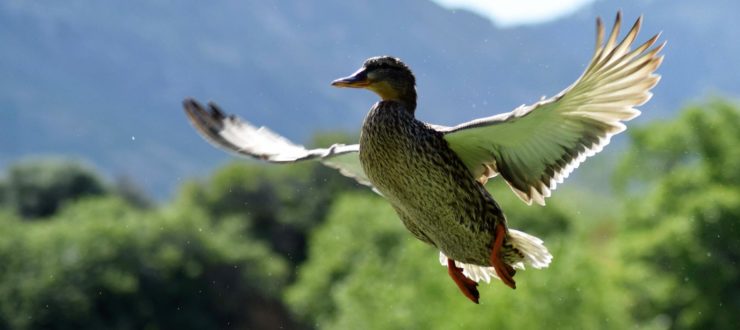
Blind Ambition: Making the Most of the Last Days of Duck Season
Duck hunters, too, are under a pressure of their own. The number of days left in duck season are numbered–and so are the chances of bagging a bird or two. That said, it’s not over until the proverbial woman of generous proportions has warbled her last notes–and it would appear that roasted duck is a favored fair.
It’s January, and ducks have been under heavy pressure for months. They have grown even more wary of our decoys and plaintive calling. They are being edged out of their favorite feeding areas by ice and plummeting temperatures.
There are several reasons why duck hunters don’t give up late in the season. The harder it gets to hunt, the more we tend to enjoy it. Late birds are rewarding. Cold hunts are part of the adventure. Quiet mornings are why we’re out there. Every day out is a chance to bag the one that would have otherwise gotten away. Plus, it seems we’re gluttons for punishment.
After years of hunting ducks (and quails) in various parts of the country, I find myself heading out to finish duck season just as I started it, armed with my shotgun, a thermos full of coffee, and a few things I’ve learned along the way. Here’s what I can tell you.
Fighting the Freeze
Probably the biggest obstacle to duck hunters late in the season is lack of open water sources; frozen lakes and rivers do not entice ducks down to the range of guns.
Fortunately, you don’t have to heat your local watering hole; you just have to find a bigger one.
Larger bodies of water hold more heat and tend to move more, keeping them from freezing and making them a viable stopping point for flocks.
If you only have small holes to hunt and moving to big water is not an option, you’ll have to make do with something a bit more mechanical. Current makers, like Ice Eaters, can keep a sizable water hole open no matter how cold the nights become and can roll out a wet welcome mat for ducks passing by.
Less is More
At this point in the season, ducks are more than a little skittish. Not only have they been called to and shot at, they’re also primed and plumed for mating season, and they’ll be less apt to take unnecessary risks. In other words, if you are hunting the same way you were hunting at the beginning of the season, you are going be disappointed.
I like to make my setup as attractive as possible and then just leave it. Fewer decoys seem to make things a little more natural or realistic. I only make adjustments if the ducks veer off at the last minute–and even then those adjustments are small.
This late in the season, I like to use fewer decoys and greater diversity. A couple of mallards off to one side, with some ringnecks and pintails off to the other side seems to appear more lifelike at this point in the game. Remember, you are mimicking what comes naturally. It is cold, and the opportunities for water are becoming more scarce; different species are more likely to intermingle.
Overcalling is also a big no-no. The birds have been hollered at all season long and, like a guy trying too hard at a bar to pick up women, the ducks can smell your desperation. Throw out a few calls and then clam up. This tactic often works better in the late season than constantly going on and on like a group of ducks would in the excitement and fervor of the autumn.
Lay It On Thick
If you have adjusted for the late season and the birds are responding, then you need to use every tool you have. Do what you can to keep warm; the more comfortable you are, the longer you can stay in the blind, and the more opportunities may present themselves. If you don’t use a face mask in the early season then I highly recommend that you do now; tt will keep your face warm and give you the extra camouflage you’ll need with wary birds.
Use natural cover as much as possible. Piling on the reeds, grass, and brush can only help, and since it is naturally occurring, it is hard to over-do it. Whether you hunt from a boat blind or a land blind, I highly recommend going the extra mile in concealment; ducks are used to lazy hunters by now and a few extra touches ensures they won’t see you coming.
Safe and Smooth
One last word on late, extreme cold duck hunting. If you have gone through all of the trouble to hunt this late in the season, the last thing you want is your gun not performing when you need it the most. Conventional gun oils can gum up and really hinder performance on super cold mornings. I highly recommend switching to a dry lubricant for this time of year.
Eventually, this season runs its course, and we all find ourselves sitting by a fire, breaking down our shotguns for a thorough cleaning, and prepping for the next hunting season. For some of us that’s next year’s duck season; for others, it’s turkey or deer. We hunters know better than most the endless seasons and cycles of life, and we know just as well how to make the most of them.
We know a lot when it comes to bagging birds, but we’re always ready to learn more. What are some of your duck hunting tips?